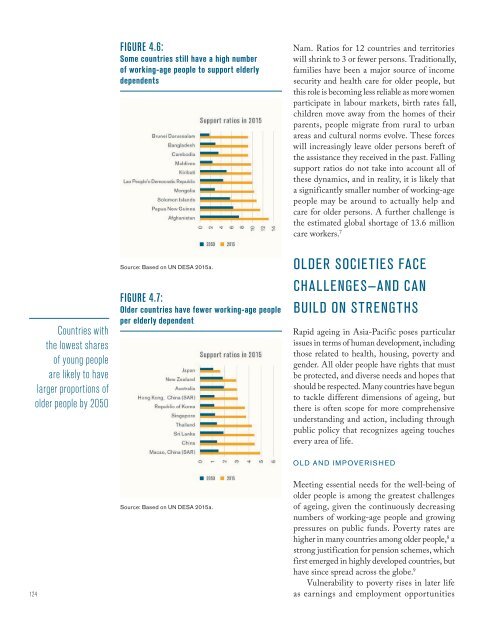SHAPING THE FUTURE HOW CHANGING DEMOGRAPHICS CAN POWER HUMAN DEVELOPMENT
1VPo4Vw
1VPo4Vw
You also want an ePaper? Increase the reach of your titles
YUMPU automatically turns print PDFs into web optimized ePapers that Google loves.
Countries with<br />
the lowest shares<br />
of young people<br />
are likely to have<br />
larger proportions of<br />
older people by 2050<br />
FIGURE 4.6:<br />
Some countries still have a high number<br />
of working-age people to support elderly<br />
dependents<br />
Source: Based on UN DESA 2015a.<br />
FIGURE 4.7:<br />
Older countries have fewer working-age people<br />
per elderly dependent<br />
Nam. Ratios for 12 countries and territories<br />
will shrink to 3 or fewer persons. Traditionally,<br />
families have been a major source of income<br />
security and health care for older people, but<br />
this role is becoming less reliable as more women<br />
participate in labour markets, birth rates fall,<br />
children move away from the homes of their<br />
parents, people migrate from rural to urban<br />
areas and cultural norms evolve. These forces<br />
will increasingly leave older persons bereft of<br />
the assistance they received in the past. Falling<br />
support ratios do not take into account all of<br />
these dynamics, and in reality, it is likely that<br />
a significantly smaller number of working-age<br />
people may be around to actually help and<br />
care for older persons. A further challenge is<br />
the estimated global shortage of 13.6 million<br />
care workers. 7<br />
OLDER SOCIETIES FACE<br />
CHALLENGES—AND <strong>CAN</strong><br />
BUILD ON STRENGTHS<br />
Rapid ageing in Asia-Pacific poses particular<br />
issues in terms of human development, including<br />
those related to health, housing, poverty and<br />
gender. All older people have rights that must<br />
be protected, and diverse needs and hopes that<br />
should be respected. Many countries have begun<br />
to tackle different dimensions of ageing, but<br />
there is often scope for more comprehensive<br />
understanding and action, including through<br />
public policy that recognizes ageing touches<br />
every area of life.<br />
OLD AND IMPOVERISHED<br />
124<br />
Source: Based on UN DESA 2015a.<br />
Meeting essential needs for the well-being of<br />
older people is among the greatest challenges<br />
of ageing, given the continuously decreasing<br />
numbers of working-age people and growing<br />
pressures on public funds. Poverty rates are<br />
higher in many countries among older people, 8 a<br />
strong justification for pension schemes, which<br />
first emerged in highly developed countries, but<br />
have since spread across the globe. 9<br />
Vulnerability to poverty rises in later life<br />
as earnings and employment opportunities


